- Home
- Brand, Max
Man From Mustang
Man From Mustang Read online
MAX BRAND
The Man
From
Mustang
a division of F+W Media, Inc.
Contents
Cover
Title Page
Chapter 1
Chapter 2
Chapter 3
Chapter 4
Chapter 5
Chapter 6
Chapter 7
Chapter 8
Chapter 9
Chapter 10
Chapter 11
Chapter 12
Chapter 13
Chapter 14
Chapter 15
Chapter 16
Chapter 17
Chapter 18
Chapter 19
Chapter 20
Chapter 21
Chapter 22
Chapter 23
Chapter 24
Chapter 25
Also Available
Copyright
Chapter 1
On the brow of the last hill that spilled from the knees of the mountains toward the prairie, under the last tree, “Silver” sat with his knees hugged in his arms and watched the rider in the distance, and the prairie fire behind him.
Parade, with bridle off and saddle on, grazed near by, biting off the short, sweet grass close to the roots, eating greedily, as though he knew that the taste of this pasturage was much sweeter than the tall, dry grasses beneath him. Now and then he jerked his head and looked suddenly at his master, and then all about him, with pricking ears, for he understood perfectly that to the wolfish keenness of his scent and to his quickness of ear and eye, Silver looked for warning if any danger came his way. Parade was a combination of stallion and sentinel, the guardian and the servant of the man.
The day was hot and dry. Silver had taken off the big sombrero as he sat in the shade, and thereby exposed the two marks of gray hair above his temples that looked like incipient horns sprouting, and had given him his universal nickname of “Silvertip.” Now he made himself at ease. He had been long enough in the mountain wilderness which he loved, and it seemed to him a typical irony of fate that as he turned his face back toward the dwellings of man he should see a rider on the plain and a grass fire at the same time. For among men there was always danger.
The fellow who jogged his horse quietly along seemed unaware of the coming fire for a long time. It had begun as a small point, like a dust cloud rolling. It increased. Evidently a wind was favoring it, and finally a gust of that breeze went whispering through the leaves above the head of Silver.
By this time the grass fire had gathered both speed and frontage, and was leaving behind it a widening wedge of black against the pallor of the prairie grass. At the same moment the lone rider became aware of the danger behind him. Silver laughed to see the man bring his mustang to a gallop and flatten out along the neck of the horse.
It was high time, but time enough, for the horse could move a great deal faster than the fire itself, though that was now galloping like a thousand wild beasts, wallowing, plunging, throwing forward a leaning wall of smoke, as though a dense mass of skirmishers were running forward with rifles firing constantly. Fast as the wind blew, pressing the smoke forward, the speeding flames ran almost as quickly. Now they rushed down a hollow with a slower gait. Now they leaped up a slope, and at the crest hurled upward a gigantic cloud of fire, as though in excess of strength. A god seemed to be rioting in that flame, bounding between earth and heaven, trailing his cloak of smoke high up in the sky.
The fugitive, in the meantime, was gaining rapidly on the wall of danger, when all at once, as he came close enough for Silver to make out that the horse was small and the man big, the mustang went down and hurled its rider far away, spinning head over heels.
The horse tried to rise at once, but a dangling foreleg prevented it. The man, on the other hand, lay perfectly still, face down, twisted as though his body had been broken in the middle.
Silver had the bridle on Parade almost before he had finished noting these things. For both horse and man lay directly in the path of the fire.
With the throatlatch unfastened, he sprang into the saddle. The big golden chestnut got under way like a frightened deer. Down the hillside he streaked, across the green like a meteor down the blue arch of the sky, and struck the level, where the tall prairie grasses whipped like splashing water about his shoulders. That impediment could not slow his speed or shorten his stride.
And angling straight toward the danger point, Silver rode him between the fallen horse and the fallen rider.
It would be a near thing. Already the running flame put out an arm of crimson and smoke that enveloped the struggling horse. The poor beast screamed with agony. Silver, twisting in the saddle, put a bullet through its head from his revolver.
Right behind him came the sweeping fire. The wind that hurried above the flames dropped a shower of sparks and whole bunches of burning grass that seemed to have been uprooted by the force of the draft! And little new fires caught hold on the dryness of the grass even before the main body of the flame had rolled to them.
One of these spots of fire was spreading at the side of the fallen rider as Silver came up. He called out. Parade stood on braced feet, and Silver, without dismounting, leaned far down from the saddle.
He took that burden under the armpits and hauled it up. The head fell back as though on a broken neck, to show Silver a young, brown face, almost absurdly homely. There was enough nose and jaw for two ordinary men, yet what the face enjoyed in length it lacked in width. But the forehead was good, and what Silver saw first and last was the frown that lingered on the brow. A dead man’s face would have been smooth, he told himself, but there was the promise of life!
With that limp body in his arms, he called again; and Parade went like a flashing gesture through the tall grass, back to the shorter growth on the hillside.
There Silver deposited his burden. He had to spend a minute beating out sparks that had begun to ignite his clothes. Parade was dancing because of a smoking place on his mane. When that was out, there were more burning spots on the clothes of the stranger.
In the meantime, the roar of the prairie fire went by, leaving acres of glowing red behind it, and the black, smoking heap where the mustang lay dead.
The unconscious man now stirred suddenly, and sat up with a gasp. He said nothing for some time. First his eye marked the distant rush and roar of the conflagration. Then he looked down and actually patted the short green of the grass on which he was sitting. At last he marked the place where the dead horse lay.
At that he started to his feet with an exclamation. It seemed to Silver that he was about to run down into the grass toward the dead horse, though there were still flaming bits that far behind the head of the fire. Silver caught his shoulder and held him.
“You’ll burn your boots, and spoiled leather won’t help that dead horse,” said Silver.
“No, you’re right,” said the other slowly. He looked at Silver with a dull eye of suffering. “He’s eaten enough right out of my hand,” said he. “And now the fire’s eaten him — right off the ground.”
He smiled. His whole face twisted with grief that he fought again.
“He was a good-looking horse,” said Silver gently.
“He was a right good one. He was a cutting horse,” said the stranger, wiping his hands on his leather chaps absently. “You put him on the tail of a calf and he’d follow that calf to kingdom come. Yes, sir, and head it off before ever it got there, in spite of anything. That’s the kind of a cutting horse he was. But the fire got him — fire!” He shuddered as he said it.
“I put a bullet through his head just before the fire ate him,” said Silver.
The stranger looked up and down, but saw no gun. A gleami
ng gesture made a big Colt with three extra inches of barrel on it appear from beneath the coat of Silver and disappear again.
“I’m thankin’ you,” said the stranger. “And you didn’t have no lot of time on your hands, neither.”
He looked down at the spots on his own clothes, some of which were still faintly smoking. Then he eyed the damaged costume of Silver. Suddenly he grinned.
“I’m goin’ to be owin’ you a suit of clothes in exchange for the skin that I’m still wearing,” he said.
“All right,” answered Silver.
“Poor old Jerry!” said the man under his breath. “I’ll tell you what he was,” he added suddenly. “He was a partner. You know?”
“I know,” said Silver.
The stranger glanced toward Parade.
“Yeah, you know, all right,” he agreed. “Maybe you know even a lot better’n I do. When I was camping out, he’d watch over me at night like a dog. We’ve been on desert marches when he ate half of my bacon and drank sugar and milk. We been on marches when I’ve boiled his oats and halved ‘em with him. Jerry,” concluded the stranger with a broad sweep of his hand, “was a horse!”
“He was,” said Silver. “Right up to the end, he was trying to get to you and tell you that the fire was coming.”
“What happened?” asked the man.
“He put his foot in a hole in the ground, I guess,” said Silver. “He broke his leg when he fell, and he couldn’t get up.
The stranger took off his sombrero and wiped from his face sweat that was never produced by the heat of the sun. He swallowed hard. Then suddenly he faced Silver.
“I don’t know your name,” he said. “Mine is Ned Kenyon.”
Silver shook the hand.
“People call me Jim,” he said, “or Arizona Jim, or Arizona. I don’t care much what I’m called.”
A slight shadow passed over the face of Kenyon, but it was gone at once.
“Any name is the right name,” he said, “for me to tell you that I’ve had my hide saved by you. The day before my wedding day, too!”
He grinned broadly, and the ugliness disappeared from his face, it was so lighted.
“The luck stays with a plumb happy man,” said Kenyon.
“It does,” agreed Silver.
“Look,” said the stranger impulsively. “I want you to see her right away. I want that you should know you’ve done more than save my hide; because maybe you’ve kept a lot finer person than me from trouble. I want you to see her.”
He jerked a flat leather case from his inside coat pocket, and then paused, and his blue, small eyes lingered wistfully on the handsome face of Silver, as though asking for permission.
“I want to see it,” said Silver. “Let’s have a look.”
That was enough.
Ned Kenyon opened the leather case and displayed the picture.
“It don’t do her justice,” he said, sidling around to Silver. “But you just get a sort of general idea, is all.”
A small, stinging shock had passed into the brain of Silver as he looked. A queer numbness spread in his mind. For as he stared, he told himself that there was only one thing under heaven he could be sure of, and that was that such a girl as this could never marry Ned Kenyon.
Silver saw her in profile, but he could tell the bigness and the straightness of the eyes, and the refinement of the mouth, and the proud lift of the chin. A king could have married her proudly, and not for her beauty only, but for things of mind and spirit that spoke out of her face.
Half squinting, Silver called up the image of the man beside him, the long, gaunt body, the long, gaunt face.
No, he decided, the thing could not be. Perhaps the poor fellow had this mania -that being unattractive to most women, he had picked up the portrait of some reigning beauty of New York or Paris, and carried it about with him, to boast pathetically of his triumph.
“She’s very beautiful,” said Silver gravely, giving back the picture.
Kenyon took it in both hands and shook his head.
“It ain’t beauty that counts. It’s the heart underneath it,” he said. “She’s a clean-bred one. Oh, she’s as straight as a string, let me tell you!”
“I’ll put money that she is,” said Silver.
“Brave, and honest, sort of simple and quiet, and about perfect,” said Kenyon slowly.
He put the picture back inside his coat.
“To-morrow at noon,” said he, “we’re going to be married in Mustang. And I wish that you were going to be there, partner. That’s what I wish. That you were going to be there, so that she could thank you face to face. I’d like to have you hear her voice — just once. Because it’s the sort of a thing that you’d never forget if you lived for a hundred years.”
Silver looked at the vanishing smoke of the prairie fire, far away, for it had been running like wild horses all this time, cleaving a greater and greater wedge of black through the pale prairie grass.
The thing could not be. Every instinct in him spoke against it. She could not, being what she was, marry this lean grotesque of a cow-puncher.
“How far is Mustang?” he asked.
“Only twenty miles!” said the other eagerly.
“Then I’ll go there with you,” said Silver. “It’s a long time since I’ve seen a wedding.”
Chapter 2
There was no doubt of one thing — that just as firmly as Silver was convinced that the wedding would never take place, just so firmly was Ned Kenyon assured that on the morrow he would be the happiest man in the world, and that this girl would be his wife.
He was ready to talk of her. Words about her overflowed his lips.
She was only twenty. Her name was Edith Alton. All the perfections that God could give to a woman had been showered upon her.
Perhaps, thought Silver, it might be an old acquaintance, one of those deep affections that grow up from years spent together — as, for instance, Kenyon might have been for long the foreman on her father’s ranch. Or perhaps there were hidden qualities in this man — he might be, for all his rather ungrammatical language, an artist, an inspired poet, or a philosopher such as Silver had met in the west more than once, filled with wisdom that seems to rise like sap from the ground.
“You’ve known her a long time?” asked Silver.
“Seven days!” said Kenyon.
Again the numb incredulity spread through the brain of Silver. Seven days!
“That’s not long,” remarked Silver. “Love at first sight, I suppose?”
“No,” answered Kenyon. “Not for her. For me, yes. But not for her. I saw her at the railroad, and I drove the stage that brought her up to Mustang. I hardly kept the wheels on the road, because I was turning all the time to look at her. And then the next day was my day off the driver’s seat, and I went to a dance, and there she turned up, and I danced with her, part of a dance.
“But she wanted to talk more than to dance. And she asked me to take her outside. We walked up and down under the pine trees, into the black of the trees, and out into the white of the moon. Mostly talking. Mostly me talking. And she listening, with her head a little on one side. It’s dead easy to talk to a girl like that!” he exclaimed. “And there was me, that never had found a girl in the world that would pay no attention to me! And there was me, with the queen of the world, as you might say!”
Silver, as he walked along at the side of his companion, the stallion following without the need of a lead, sighed a little. The problem was beginning to grow more and more unfathomable to him. Behind it there lay a mystery as profound as a pit, a darkness which his eye could not penetrate. But with every step he made at the side of this man, the more convinced he became of the man’s steel-true honesty and worth. There was not a crooked bone in his body, not a shadowy thought in his brain.
“You talked of a lot of things?” asked Silver.
“We talked about me,” said the stage driver. “She seemed a lot interested in that. I told her about b
eing a kid on the farm in Dakota, and about the way the winter lasted, and the way the spring came up, and the way the snow first melted, and the spring skating, and a lot of things like that, and how I came farther west, and about prospecting, and all that, and how I started to drive the stage, and got along at that because I got a way with horses. And she listened like a baby to music all the time, with her head a little over on one side, and now and then turning her head, and smiling at me a bit. In a way,” said Kenyon, “that I couldn’t tell you about it. Just a kind of a smile that soaked into you, like spring sunshine!”
He was no poet, either, thought Silver — just a fine, honest, decent fellow, with unprobed virtues of courage and decency. But a mate for that girl in the picture, with her lifted chin and her straight-looking eyes, and the sensitive nose and lips?
No! Whatever happened, it could not be that she intended to marry Ned Kenyon.
“You go on and ride,” Kenyon was saying. “I don’t mind walking. I’m pretty good at it. And with Edith to talk about, I could walk to the end of the world.”
Something jerked at Silver, something pulled him up in revolt even to hear Ned Kenyon call the girl by her first name — and yet he was to marry her on the morrow!
“If you could ride half the time while I walked,” said Silver, “it would be all right. But this horse doesn’t like most people, and he’d be fighting every minute to get you out of the saddle.”
“Would he?” murmured Kenyon.
He gave the brim of his hat a jerk.
“I ain’t boasting,” he said, “but the fact is that I’m pretty fair with horses my own self. I’d like to try him, if you don’t mind, stallion or no stallion!”
“Would you?” said Silver, smiling. Then he laid a hand on Kenyon’s bony shoulder and added: “Don’t do it. He’s a trickster. He knows a thousand ways of getting a man out of the saddle, and the worst of him is that when the rider drops, he has a way of trying to savage the unlucky fellow. I’d be on hand, but I might not be close enough to call him off in time. I don’t doubt that you’re a good rider — but I’d rather not have you try him.”

 Alcatraz
Alcatraz the Long, Long Trail (1923)
the Long, Long Trail (1923)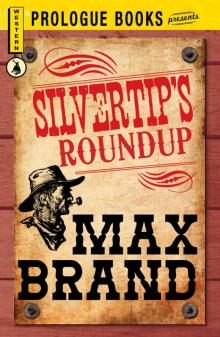 Silvertip's Roundup
Silvertip's Roundup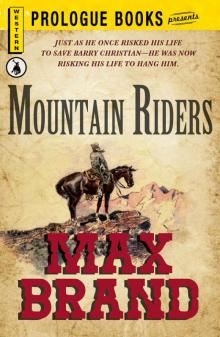 Mountain Riders
Mountain Riders Silvertip (1942)
Silvertip (1942)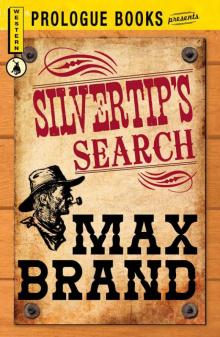 Silvertip's Search
Silvertip's Search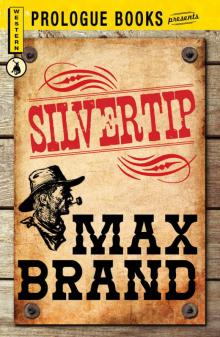 Silvertip
Silvertip Bull Hunter
Bull Hunter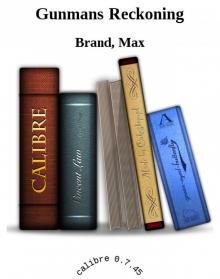 Gunmans Reckoning
Gunmans Reckoning The Seventh Man
The Seventh Man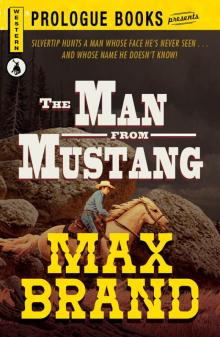 Man From Mustang
Man From Mustang Riders of the Silences
Riders of the Silences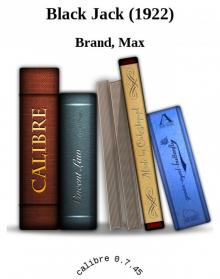 Black Jack (1922)
Black Jack (1922) Way of the Lawless
Way of the Lawless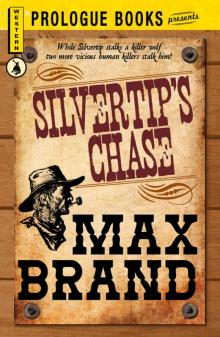 Silvertip's Chase
Silvertip's Chase Trailin
Trailin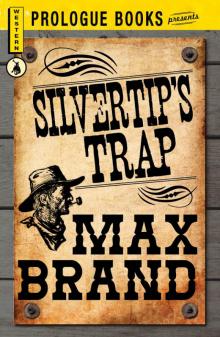 Silvertip's Trap
Silvertip's Trap Ronicky Doone (1921)
Ronicky Doone (1921) The Night Horseman
The Night Horseman the Garden Of Eden (1963)
the Garden Of Eden (1963)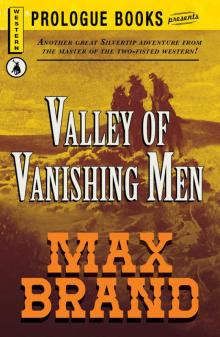 Valley of the Vanishing Men
Valley of the Vanishing Men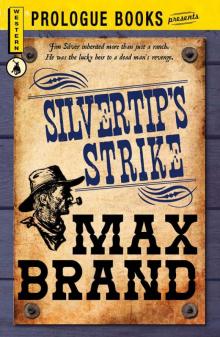 Silvertip's Strike
Silvertip's Strike Black Jack
Black Jack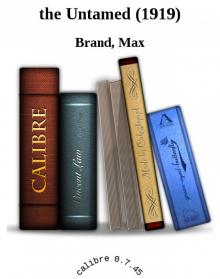 the Untamed (1919)
the Untamed (1919) Way Of the Lawless (1921)
Way Of the Lawless (1921) The Untamed
The Untamed